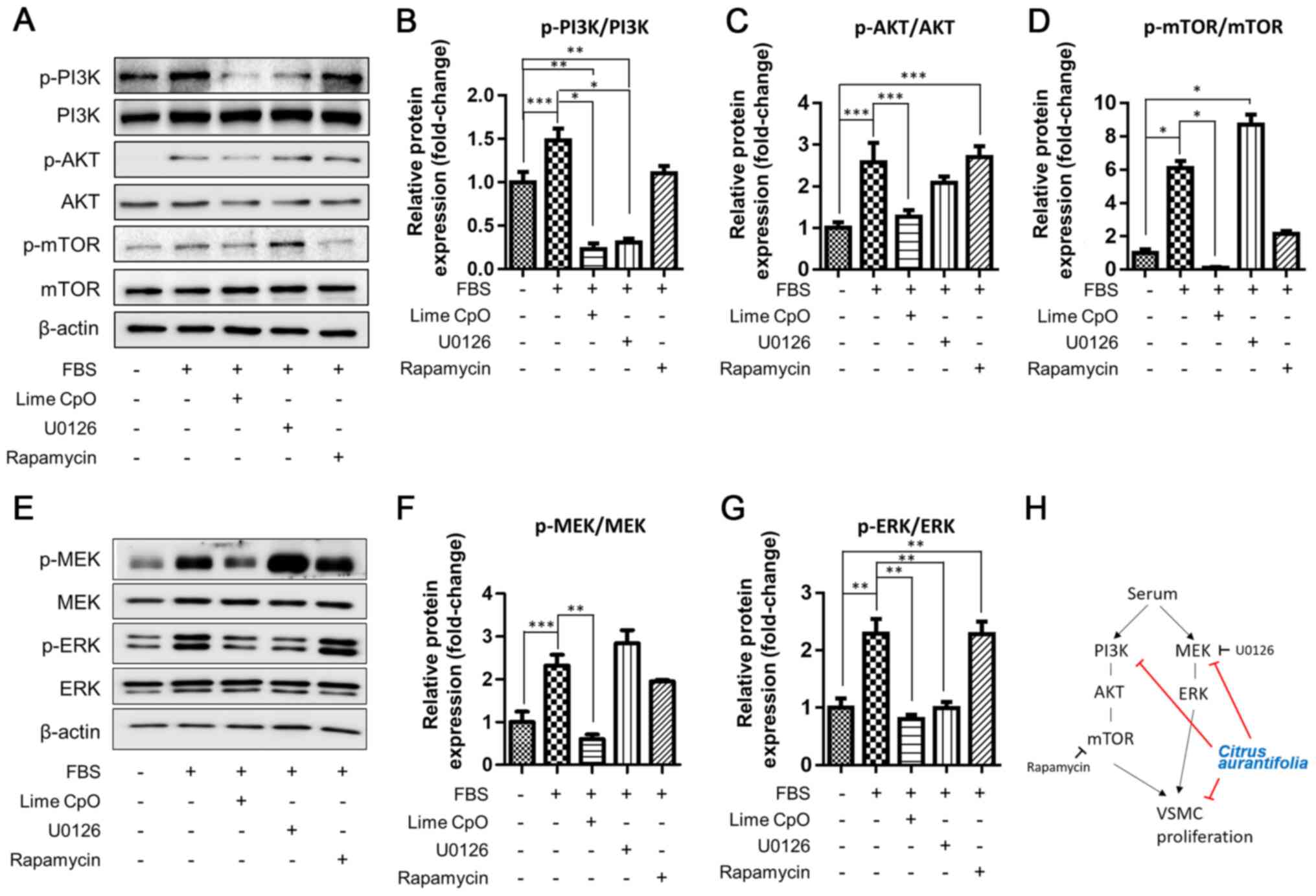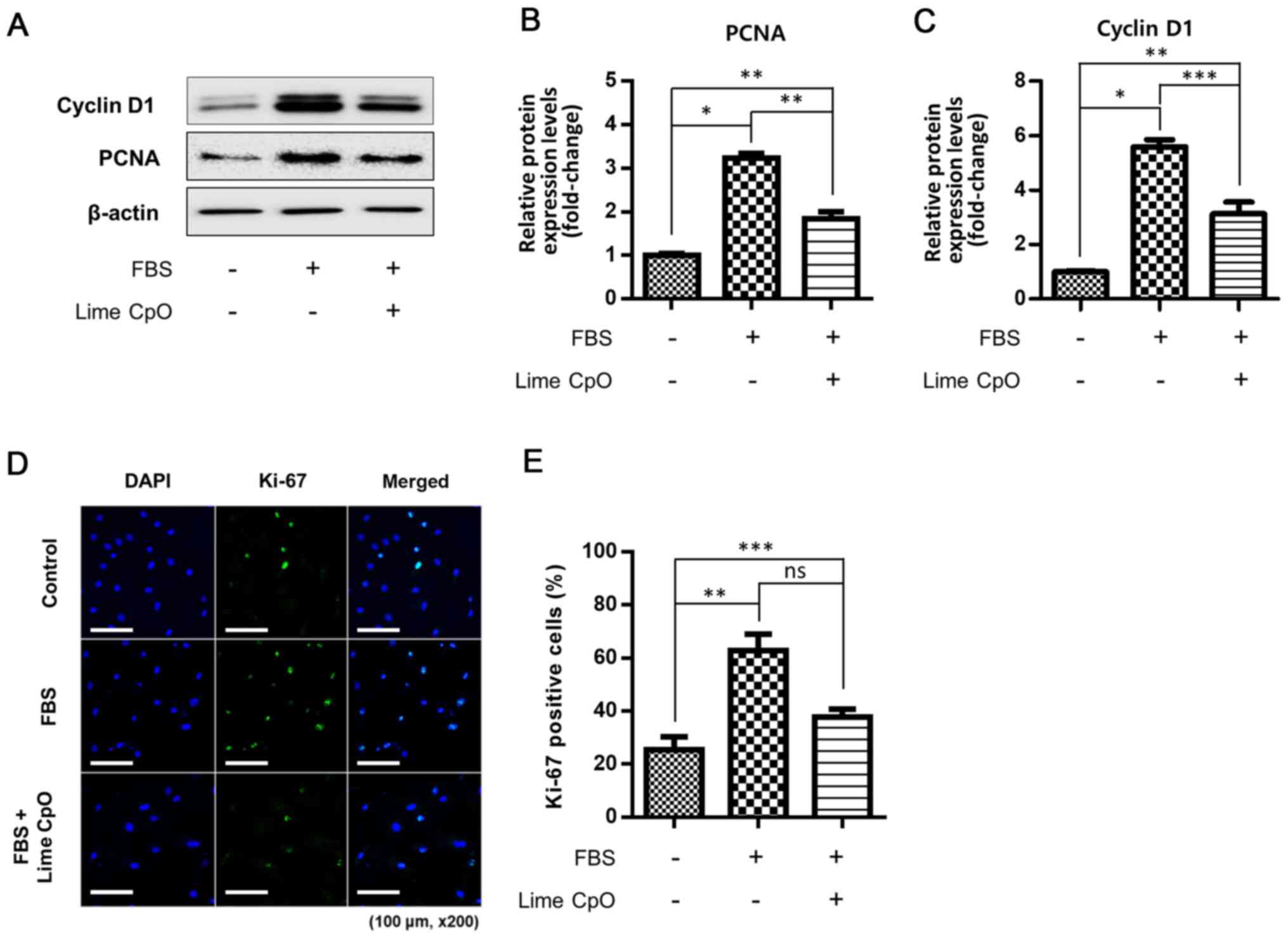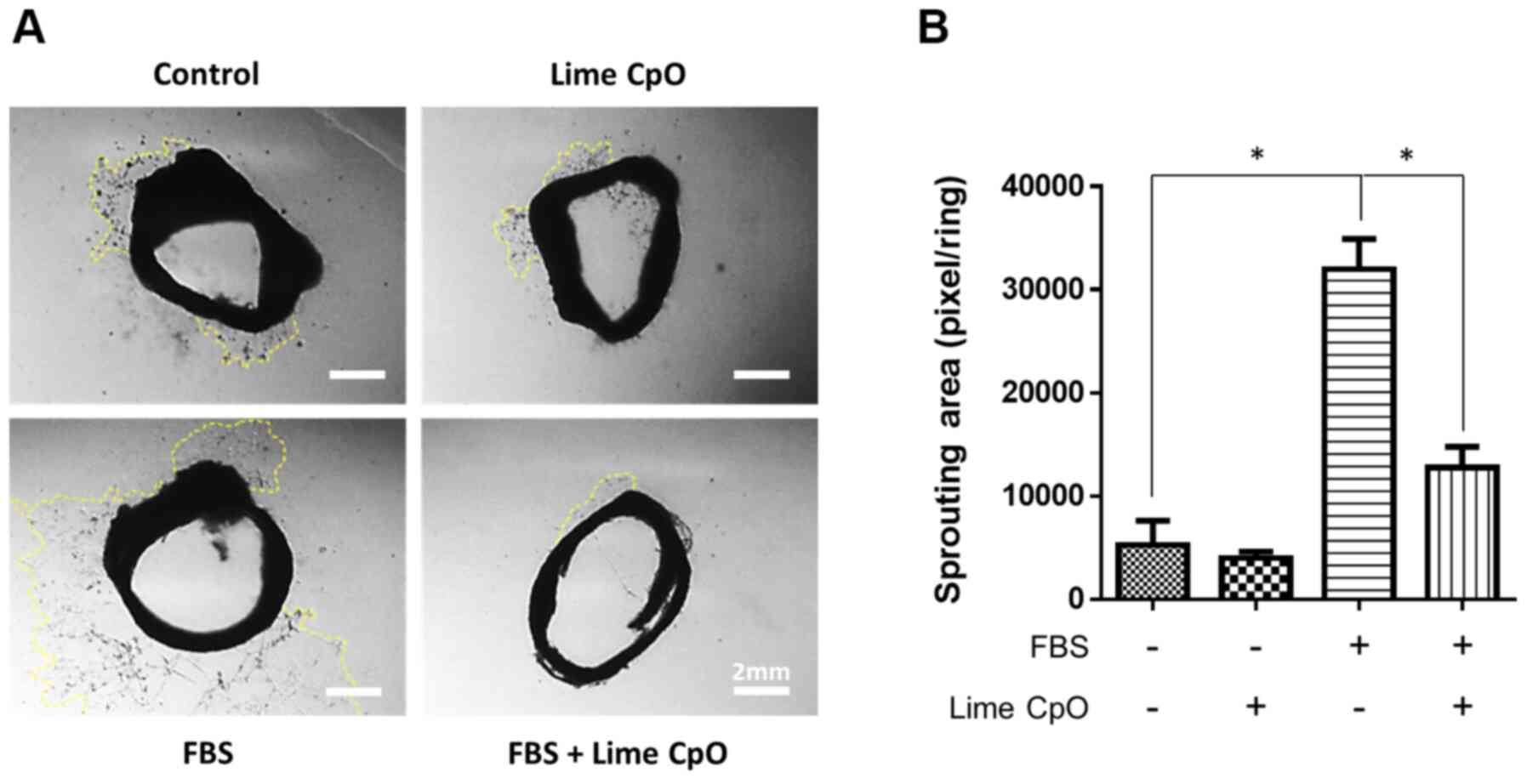|
1
|
Rensen SSM, Doevendans PAFM and van Eys
GJJM: Regulation and characteristics of vascular smooth muscle cell
phenotypic diversity. Neth Heart J. 15:100–108. 2007.PubMed/NCBI View Article : Google Scholar
|
|
2
|
Hao H, Gabbiani G and Bochaton-Piallat ML:
Arterial smooth muscle cell heterogeneity: Implications for
atherosclerosis and restenosis development. Arterioscler Thromb
Vasc Biol. 23:1510–1520. 2003.PubMed/NCBI View Article : Google Scholar
|
|
3
|
Morgan JP, Perreault CL and Morgan KG: The
cellular basis of contraction and relaxation in cardiac and
vascular smooth muscle. Am Heart J. 121:961–968. 1991.PubMed/NCBI View Article : Google Scholar
|
|
4
|
Sprague AH and Khalil RA: Inflammatory
cytokines in vascular dysfunction and vascular disease. Biochem
Pharmacol. 78:539–552. 2009.PubMed/NCBI View Article : Google Scholar
|
|
5
|
Gomez D and Owens GK: Smooth muscle cell
phenotypic switching in atherosclerosis. Cardiovasc Res.
95:156–164. 2012.PubMed/NCBI View Article : Google Scholar
|
|
6
|
Anwar MA, Shalhoub J, Lim CS, Gohel MS and
Davies AH: The effect of pressure-induced mechanical stretch on
vascular wall differential gene expression. J Vasc Res. 49:463–478.
2012.PubMed/NCBI View Article : Google Scholar
|
|
7
|
Owens GK, Kumar MS and Wamhoff BR:
Molecular regulation of vascular smooth muscle cell differentiation
in development and disease. Physiol Rev. 84:767–801.
2004.PubMed/NCBI View Article : Google Scholar
|
|
8
|
Clowes AW and Reidy MA: Prevention of
stenosis after vascular reconstruction: Pharmacologic control of
intimal hyperplasia - a review. J Vasc Surg. 13:885–891.
1991.PubMed/NCBI View Article : Google Scholar
|
|
9
|
Garg S and Serruys PW: Coronary stents:
Current status. J Am Coll Cardiol. 56 (Suppl 10):S1–S42.
2010.PubMed/NCBI View Article : Google Scholar
|
|
10
|
de Andrade TU, Brasil GA, Endringer DC, da
Nóbrega FR and de Sousa DP: Cardiovascular activity of the chemical
constituents of essential oils. Molecules. 22(E1539)2017.PubMed/NCBI View Article : Google Scholar
|
|
11
|
Amorati R, Foti MC and Valgimigli L:
Antioxidant activity of essential oils. J Agric Food Chem.
61:10835–10847. 2013.PubMed/NCBI View Article : Google Scholar
|
|
12
|
Dosoky NS and Setzer WN: Biological
activities and safety of Citrus spp. essential oils. Int J
Mol Sci. 19(1966)2018.PubMed/NCBI View Article : Google Scholar
|
|
13
|
Reis D and Jones T: Aromatherapy: Using
Essential Oils as a Supportive Therapy. Clin J Oncol Nurs.
21:16–19. 2017.PubMed/NCBI View Article : Google Scholar
|
|
14
|
Spadaro F, Costa R, Circosta C and
Occhiuto F: Volatile composition and biological activity of key
lime Citrus aurantifolia essential oil. Nat Prod Commun.
7:1523–1526. 2012.PubMed/NCBI
|
|
15
|
Amorim JL, Simas DLR, Pinheiro MMG, Moreno
DSA, Alviano CS, da Silva AJR and Fernandes PD: Anti-inflammatory
properties and chemical characterization of the essential oils of
four Citrus species. PLoS One. 11(e0153643)2016.PubMed/NCBI View Article : Google Scholar
|
|
16
|
Kummer R, Fachini-Queiroz FC,
Estevão-Silva CF, Grespan R, Silva EL, Bersani-Amado CA and Cuman
RKN: Evaluation of anti-inflammatory activity of Citrus
latifolia Tanaka essential oil and limonene in experimental
mouse models. Evid Based Complement Alternat Med.
2013(859083)2013.PubMed/NCBI View Article : Google Scholar
|
|
17
|
Narang N and Jiraungkoorskul W: Anticancer
Activity of Key Lime, Citrus aurantifolia. Pharmacogn Rev.
10:118–122. 2016.PubMed/NCBI View Article : Google Scholar
|
|
18
|
Patil JR, Chidambara Murthy KN,
Jayaprakasha GK, Chetti MB and Patil BS: Bioactive compounds from
Mexican lime (Citrus aurantifolia) juice induce apoptosis in
human pancreatic cells. J Agric Food Chem. 57:10933–10942.
2009.PubMed/NCBI View Article : Google Scholar
|
|
19
|
Tosukhowong P, Yachantha C,
Sasivongsbhakdi T, Ratchanon S, Chaisawasdi S, Boonla C and
Tungsanga K: Citraturic, alkalinizing and antioxidative effects of
limeade-based regimen in nephrolithiasis patients. Urol Res.
36:149–155. 2008.PubMed/NCBI View Article : Google Scholar
|
|
20
|
Boshtam M, Moshtaghian J, Naderi G, Asgary
S and Nayeri H: Antioxidant effects of Citrus aurantifolia
(Christm) juice and peel extract on LDL oxidation. J Res Med Sci.
16:951–955. 2011.PubMed/NCBI
|
|
21
|
Kato Y, Domoto T, Hiramitsu M, Katagiri T,
Sato K, Miyake Y, Aoi S, Ishihara K, Ikeda H, Umei N, et al: Effect
on blood pressure of daily lemon ingestion and walking. J Nutr
Metab. 2014(912684)2014.PubMed/NCBI View Article : Google Scholar
|
|
22
|
Muslin AJ: MAPK signalling in
cardiovascular health and disease: Molecular mechanisms and
therapeutic targets. Clin Sci (Lond). 115:203–218. 2008.PubMed/NCBI View Article : Google Scholar
|
|
23
|
Muto A, Fitzgerald TN, Pimiento JM,
Maloney SP, Teso D, Paszkowiak JJ, Westvik TS, Kudo FA, Nishibe T
and Dardik A: Smooth muscle cell signal transduction: implications
of vascular biology for vascular surgeons. J Vasc Surg. 45 (Suppl
A):A15–A24. 2007.PubMed/NCBI View Article : Google Scholar
|
|
24
|
National Research Council (US) Committee
for the Update of the Guide for the Care and Use of Laboratory
Animals: Guide for the Care and Use of Laboratory Animals, 8th
edition. National Academies Press (US), Washington, DC, 2011.
|
|
25
|
Chang W, Lim S, Song H, Song BW, Kim HJ,
Cha MJ, Sung JM, Kim TW and Hwang KC: Cordycepin inhibits vascular
smooth muscle cell proliferation. Eur J Pharmacol. 597:64–69.
2008.PubMed/NCBI View Article : Google Scholar
|
|
26
|
Lim S, Lee SY, Seo HH, Ham O, Lee C, Park
JH, Lee J, Seung M, Yun I, Han SM, et al: Regulation of
mitochondrial morphology by positive feedback interaction between
PKCδ and Drp1 in vascular smooth muscle cell. J Cell Biochem.
116:648–660. 2015.PubMed/NCBI View Article : Google Scholar
|
|
27
|
Mathew OP, Ranganna K, Mathew J, Zhu M,
Yousefipour Z, Selvam C and Milton SG: Cellular effects of butylate
on vascular smooth muscle cells are mediated through disparate
actions on dual targets, histone deacetylase (HDAC) activity and
PI3K/Akt signaling network. Int J Mol Sci. 20(2902)2019.PubMed/NCBI View Article : Google Scholar
|
|
28
|
Suen J, Thomas J, Kranz A, Vun S and
Miller M: Effect of flavonoids on oxidative stress and inflammation
in adults at risk of cardiovascular disease: a systematic review.
Healthcare (Basel). 4(69)2016.PubMed/NCBI View Article : Google Scholar
|
|
29
|
Li D, Wu H, Dou H, Guo L and Huang W:
Microcapsule of sweet orange essential oil changes gut microbiota
in diet-induced obese rats. Biochem Biophys Res Commun.
505:991–995. 2018.PubMed/NCBI View Article : Google Scholar
|
|
30
|
Jiang D, Li D and Wu W: Inhibitory effects
and mechanisms of luteolin on proliferation and migration of
vascular smooth muscle cells. Nutrients. 5:1648–1659.
2013.PubMed/NCBI View Article : Google Scholar
|
|
31
|
Lv X, Zhao S, Ning Z, Zeng H, Shu Y, Tao
O, Xiao C, Lu C and Liu Y: Citrus fruits as a treasure trove of
active natural metabolites that potentially provide benefits for
human health. Chem Cent J. 9(68)2015.PubMed/NCBI View Article : Google Scholar
|
|
32
|
Aziz ZAA, Ahmad A, Setapar SHM, Karakucuk
A, Azim MM, Lokhat D, Rafatullah M, Ganash M, Kamal MA and Ashraf
GM: Essential oils: extraction techniques, pharmaceutical and
therapeutic potential - a review. Curr Drug Metab. 19:1100–1110.
2018.PubMed/NCBI View Article : Google Scholar
|
|
33
|
Lin LY, Chuang CH, Chen HC and Yang KM:
Lime (Citrus aurantifolia (Christm.) swingle) essential
oils: volatile compounds, antioxidant capacity, and hypolipidemic
effect. Foods. 8(E398)2019.PubMed/NCBI View Article : Google Scholar
|
|
34
|
Adokoh CK, Asante DB, Acheampong DO,
Kotsuchibashi Y, Armah FA, Sirikyi IH, Kimura K, Gmakame E and
Abdul-Rauf S: Chemical profile and in vivo toxicity evaluation of
unripe Citrus aurantifolia essential oil. Toxicol Rep.
6:692–702. 2019.PubMed/NCBI View Article : Google Scholar
|
|
35
|
Kang P, Ryu K-H, Lee J-M, Kim H-K and Seol
GH: Endothelium- and smooth muscle-dependent vasodilator effects of
Citrus aurantium L. var. amara: Focus on Ca(2+) modulation.
Biomed Pharmacother. 82:467–471. 2016.PubMed/NCBI View Article : Google Scholar
|
|
36
|
Ammar AH, Bouajila J, Lebrihi A, Mathieu
F, Romdhane M and Zagrouba F: Chemical composition and in vitro
antimicrobial and antioxidant activities of Citrus aurantium
L. flowers essential oil (Neroli oil). Pak J Biol Sci.
15:1034–1040. 2012.PubMed/NCBI View Article : Google Scholar
|
|
37
|
Ao Y, Satoh K, Shibano K, Kawahito Y and
Shioda S: Singlet oxygen scavenging activity and cytotoxicity of
essential oils from rutaceae. J Clin Biochem Nutr. 43:6–12.
2008.PubMed/NCBI View Article : Google Scholar
|


















